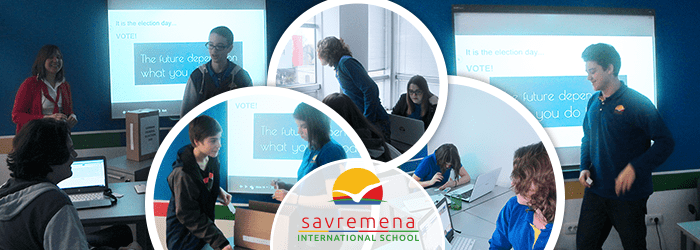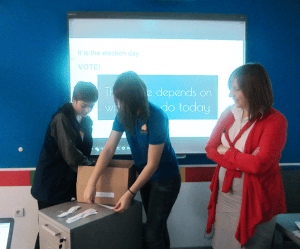In order to revise what they have learned in history in the best possible way, Savremena’s students stepped into the shoes of different personalities from the 1920s. As German citizens of that time, they explored and learned about the ways in which economic and political factors intertwine and influence each other.
The Weimar Republic in the classroom
Traveling through time, students had to think about the various problems Germany faced in 1928 after an unprecedented hyperinflation.
Snippets from the movie “Cabaret” and a short documentary about the Great Depression in Germany helped revive the atmosphere that descended upon the Weimar Republic allowing students to make informed comments on the economic crisis at the time and on how it influenced the political views of the people they were representing.
 By discussing the situation in Germany in the 1930s, students came to understand how Germany’s economic recovery decreased the power of far-right parties like Hitler’s National Socialist Party.
By discussing the situation in Germany in the 1930s, students came to understand how Germany’s economic recovery decreased the power of far-right parties like Hitler’s National Socialist Party.
 Elections simulation in Germany
Elections simulation in Germany
During the second part of the lesson, Savremena’s students simulated the federal elections. In order to be able to vote, students learned about the policies of the four major parties which were stuck on propaganda posters in the classroom.
Every student had the right to vote while the volunteers had to count the ballots. After the election was completed, and all the votes were tallied, students compared the results with those of the real election held in Germany in 1932.
Time travel for a better understanding of history
By simulating the state of Germany at the time, students were able to clearly understand the events and circumstances that lead up to the Second World War as well as the way in which a mixture of economic and political factors influenced it.
By traveling back in time and putting themselves in the shoes of imaginary citizens at the time, remembering historical events and important dates became much more interesting, while the lessons that we can learn from history are made clearer than ever.



 Elections simulation in Germany
Elections simulation in Germany
